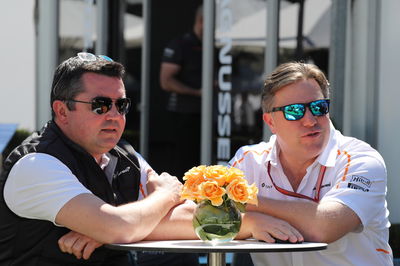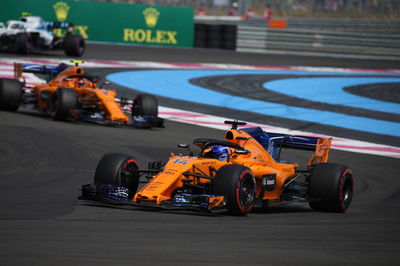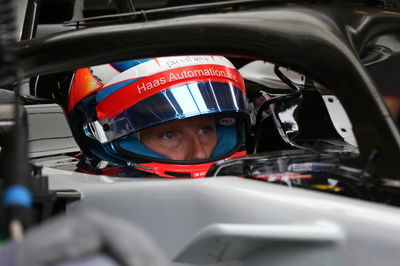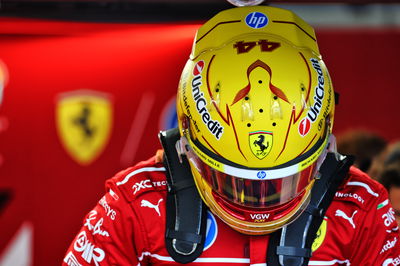How do you solve a problem like McLaren?
It’s hard not to feel sorry for Eric Boullier, who resigned from McLaren this week after several years at the helm of a slowly sinking ship. Boullier inherited an ailing vessel, failed to turn it around, and has now fallen on his sword.
Boullier became the scapegoat, but it is worth remembering that the Frenchman’s last grand prix win - at the 2013 Australian Grand Prix - is more recent than McLaren’s, which took place at the end of 2012. The former Lotus team boss took the reins at McLaren in an era when the Woking racers were already showing signs of a slowdown.

It’s hard not to feel sorry for Eric Boullier, who resigned from McLaren this week after several years at the helm of a slowly sinking ship. Boullier inherited an ailing vessel, failed to turn it around, and has now fallen on his sword.
Boullier became the scapegoat, but it is worth remembering that the Frenchman’s last grand prix win - at the 2013 Australian Grand Prix - is more recent than McLaren’s, which took place at the end of 2012. The former Lotus team boss took the reins at McLaren in an era when the Woking racers were already showing signs of a slowdown.
The 2012 season had seen the team once renowned for its attention to detail fluff a series of pit stops and race strategies, the lost points from which took them out of contention for the championship earlier than the car or drivers deserved. The following year was the beginning of the rapid decline. Lewis Hamilton made the move to Mercedes, and the team that reared him secured no podiums and a season-best result of fourth place in Interlagos.
A change of line-up for 2014 heralded the team’s last true podium finish, when Kevin Magnussen was third at the Australian Grand Prix, promoted to second after Daniel Ricciardo’s disqualification. It was also the year that Boullier became racing director - a role without technical responsibility for the car or its design.
Racing fans know that McLaren have been struggling for years. Honda took a lot of blame for issues that have since been made patently clear were far from their fault alone, while McLaren persisted in claiming - despite evidence to the contrary - that they boasted the fastest chassis on the grid, and were held back only by their choice of power unit partner.
Now that the swap to Renault power has proven beyond shadow of a doubt that McLaren has inherent issues in the car itself, with confirmation arriving on Thursday that this year’s car lacks the same level of downforce as its Honda-powered predecessor. Heads have rolled at Woking, and those that remain are finally beginning to take a responsible approach to managing expectations.
Zak Brown, the team’s Racing CEO, addressed the media in an open session at Silverstone on Thursday, and spoke of the need for a long-term fix for McLaren’s woes.
“Realistically, this is going to take some time to fix,” he said. “I think we are years away. I don’t know if that’s two or 10, or somewhere in-between. Probably more like somewhere in between, but I don’t want to get into predictions. I think we have to be very realistic and honest with ourselves, with our fans, with you, to say that this is going to be a journey. I think everyone needs to recognise that.”
Unsurprisingly, for a man employed by an organisation that has been scything away at its staff since the start of the season, Brown made repeated calls for stability at the helm of the ship.

“If I take a look at how we got to where we are today, which is in an uncompetitive, unacceptable situation, I don’t think this was the making of any one individual,” Brown said in his opening remarks. “If you rewind to the turn of this decade, we’ve had a lot of lack of stability. We’ve had team principal in, team principal out, CEO in, CEO out, shareholder in, shareholder buying, shareholder out, etc.
"I think any company - whether you’re a Formula 1 team or consumer packaged goods - it’s pretty difficult to bring stability and direction moving forward when things are constantly changing.”
Later on, he emphasised the point: “I think we need to work better to work faster. I don’t think we need to take people out of the system. I think what we are not doing is working at maximum capacity relative to the amount of human capital and resources that we have at our disposal.”
Brown is right to be wary. Recent years - and particularly recent months - have shown that McLaren is not afraid of removing high profile people from high profile roles. If there was no sentimentality for Ron Dennis, who turned the team into the behemoth it became, there will be none for a man who was hired to bring in sponsorship to the team and who has yet to sign anything considered a big sticker deal.
That Brown has no responsibility for the design or performance of the car matters not. Racing director Boullier was involved in management, not engineering - yet he found himself felled by McLaren’s continuing run of poor performance. If Brown doesn’t want to be the next executive to fall on his sword, he’s going to have to improve the team's performance on the sponsorship front - a tough task for a struggling outfit.











